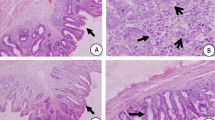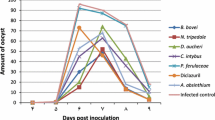Abstract
This study consists of the evaluation of the anticoccidial effect of Artemisia herba-alba Asso during experimental coccidial infection. Four groups of 30 broiler chickens were formed: the negative control (G1), the positive control (G2), the infected Monensin-treated group (G3), and the infected Artemisia-treated group (G4). Each infected bird received orally 105 sporulated oocysts of Eimeria tenella. No mortality was recorded in both G1 and G4. Haematocrit levels showed great variations from the 7th day post-infection, especially in G2 (20.87% ± 5.77). By day 10 P-I, haematocrit recovery was rapid particularly in G4 (28.07% ± 1.50). Haemoglobin concentration also decreased significantly (p < 0.05) in all infected groups by the 7th day P-I. The reduction was very marked, but not statistically significant, in G2 (6.47 g/dL ± 1.67) against (10.53 g/dL ± 0.25) in G1. It was less marked in G4 (8.05 g/dL ± 1.56). Results show the protective effect of A. herba-alba Asso by improving the lesion score and the haematological parameters affected during coccidian infection.


Similar content being viewed by others
Availability of data and material
Not applicable.
Code availability
Not applicable.
References
Abbas, T.E., 2012. Phytogenic Feed Additives as a Coccidiostat in Poultry. Bulletin of Environment, Pharmacology, and Life Sciences, 7, 22–24.
Acharya, K.P. and Acharya, N., 2017. Alternatives To Fight Against Coccidiosis: A Review. Nepalese Veteinary Journal, 34, 152-167. https://doi.org/10.3126/nvj.v34i0.22918
Akhtar, M., Awais, M.M., Anwar, M.I., Ehtisham-ul, S., Nasir, A., Saleemi, M.K. and Ashraf, K., 2015. The effect of infection with mixed Eimeria species on hematology and immune responses following Newcastle disease and infectious bursal disease booster vaccination in broilers. Veterinary Quarterly, 35:1, 21-26. https://doi.org/10.1080/01652176.2014.991048
Aljedaie, M.M. and Al-Malki, E.S., 2020. Anticoccidial activities of Salvadora persica(arak), Zingiber officinale (ginger) and Curcuma longa (turmeric) extracts on the control of chicken coccidiosis. Journal of King Saud University - Science, 32:6, 2810–2817. https://doi.org/10.1016/j.jksus.2020.07.002
Allen, P.C., Lydon, J. and Danforth, H.D., 1997. Effects of Components of Artemisia annua on Coccidia Infections in Chickens. Poultry Science, 76:8, 1156–1163. https://doi.org/10.1093/ps/76.8.1156
Almeida, G.F.D., Horsted, K., Thamsborg, S.M., Kyvsgaard, N.C., Ferreira, J.F.S. and Hermansen, J.E., 2012. Use of Artemisia annua as a natural coccidiostat in free-range broilers and its effects on infection dynamics and performance. Veterinary Parasitology, 186:3-4, 178–187. https://doi.org/10.1016/j.vetpar.2011.11.058
Arab, H.A., Rahbari, S., Rassouli, A., Moslemi, M.H. and Khosravirad, F., 2006. Determination of artemisinin in Artemisia sieberi and anticoccidial effects of the plant extract in broiler chickens. Tropical Animal Health and Production, 38:6, 497–503. https://doi.org/10.1007/s11250-006-4390-8
Bezza, L., Mannarino, A., Fattarsi, K., Mikail, C., Abou, L., Hadji-Minaglou, F. and Kaloustian, J., 2010. Composition chimique de l’huile essentielle d’Artemisia herba-alba provenant de la région de Biskra (Algérie). Phytotherapie, 8 :5, 277–281. https://doi.org/10.1007/s10298-010-0576-3
Chandrakesan, P., Muralidharan, K., Kumar, V.D., Ponnudurai, G., Harikrishnan, T.J. and Rani, K.S.V.N., 2009. Efficacy of a herbal complex against caecal coccidiosis in broiler chickens. Veterinarski Arhiv, 79:2, 199–203.
Chen, H.L., Zhao, X.Y., Zhao, G.X., Huang, H.B., Li, H.R., Shi, C.W., Yang, W.T., Jiang, Y.L., Wang, J.Z., Ye, L.P., Zhao, Q., Wang, C.F. and Yang, G.L., 2020. Dissection of the cecal microbial community in chickens after Eimeria tenella infection. Parasites and Vectors, 13:1, 1–15. https://doi.org/10.1186/s13071-020-3897-6
Conway, D.P. and McKenzie, M.E., 2008. Poultry Coccidiosis: Diagnostic and Testing Procedures. Third Edition., Blackwel, Oxford OX4 2DQ, UK, pp. 168. https://doi.org/10.1002/9780470344620
Covello, P.S., Teoh, K.H., Polichuk, D.R., Reed, D.W. and Nowak, G., 2007. Functional genomics and the biosynthesis of artemisinin. Phytochemistry, 68:14, 1864–1871. https://doi.org/10.1016/j.phytochem.2007.02.016
Del Cacho, E., Gallego, M., Francesch, M., Quílez, J. and Sánchez-Acedo, C., 2010. Effect of artemisinin on oocyst wall formation and sporulation during Eimeria tenella infection. Parasitology International, 59:4, 506–511. https://doi.org/10.1016/j.parint.2010.04.001
Dragan, L., Titilincu, A., Dan, I., Dunca, I., Dragan, M. and Mircean, V., 2010. Effects of Artemisia annua and Pimpinella anisum on Eimeria tenella (Phylum Apicomplexa) low infection in chickens. Revista Scientia Parasitologica, 11:2, 77–82.
Du, A. and Hu, S., 2004. Effects of a herbal complex against Eimeria tenella infection in chickens. Journal of Veterinary Medicine Series B: Infectious Diseases and Veterinary Public Health, 51:4, 194–197. https://doi.org/10.1111/j.1439-0450.2004.00749.x
Feuerstein, I., Danin, A. and Segal, R., 1988. Constitution of the essential oil from an Artemisia herba-alba population of Spain. Phytochemistry, 27:2, 433–434. https://doi.org/10.1016/0031-9422(88)83114-5.
Giannenas, I., Florou-Paneri, P., Papazahariadou, M., Christaki, E., Botsoglou, N.A. and Spais, A.B., 2003. Effect of dietary supplementation with oregano essential oil on performance of broilers after experimental infection with Eimeria tenella. Archives of Animal Nutrition, 57:2, 99–106. https://doi.org/10.1080/0003942031000107299
Habibi, H., Firouzi, S., Nili, H., Razavi, M., Asadi, S.L. and Daneshi, S., 2016. Anticoccidial effects of herbal extracts on Eimeria tenella infection in broiler chickens: in vitro and in vivo study. Journal of Parasitic Diseases, 40:2, 401–407. https://doi.org/10.1007/s12639-014-0517-4
Janssens, G., 2009. Répertoire d’analyses de biologie clinique. Institut de biologie clinique. Université libre de Bruxelles. 257p. http://www.ulb-ibc.be/Repertoire_IBC_2009_2.pdf.
Jiao, J., Yang, Y., Liu, M., Li, J., Cui, Y., Yin, S. and Tao, J., 2018. Artemisinin and Artemisia annua leaves alleviate Eimeria tenella infection by facilitating apoptosis of host cells and suppressing inflammatory response. Veterinary Parasitology, 254, 172–177. https://doi.org/10.1016/j.vetpar.2018.03.017
Johnson, J. and Reid, W.M., 1970. Anticoccidial drugs: Lesion scoring techniques in battery and floor-pen experiments with chickens. Experimental Parasitology, 28:1, 30–36. https://doi.org/10.1016/0014-4894(70)90063-9
Kaboutari, J., Arab, H.A., Ebrahimi, K. and Rahbari, S., 2013. Prophylactic and therapeutic effects of a novel granulated formulation of Artemisia extract on broiler coccidiosis. Tropical Animal Health and Production, 46:1, 43–48. https://doi.org/10.1007/s11250-013-0444-x
Kadhim, L.I., 2014. Histopathological Changes of Broilers Immunized With Sonicated Oocysts Against Eimeria Tenella. International Journal of Advanced Biological Research, 4:1, 31–35.
Lu, F., He, X.L., Richard, C. and Cao, J., 2019. A brief history of artemisinin: Modes of action and mechanisms of resistance. Chinese Journal of Natural Medicines, 17:5, 331–336. https://doi.org/10.1016/s1875-5364(19)30038-x
Machín, L., Nápoles, R., Gille, L. and Monzote, L., 2021. Leishmania amazonensis response to artemisinin and derivatives. Parasitology International, 80, 102218. https://doi.org/10.1016/j.parint.2020.102218
Meshnick, S.R., 2002. Artemisinin: mechanisms of action, resistance and toxicity. International Journal for Parasitology, 32, 1655–1660. https://doi.org/10.1016/S0020-7519(02)00194-7
Messaï, L., Hegazy, M.E.F., Ahmed, A.A., Ali, K., Belkacemi, D. and Ohta, S., 2008. Sesquiterpene lactones from Algerian Artemisia herba-alba. Phytochemistry Letters, 1:2, 85–88. https://doi.org/10.1016/j.phytol.2008.04.002
Moraes, P.O., Cardinal, K.M., Gouvêa, F.L., Schroeder, B., Ceron, M.S., Lunedo, R., Frazzon, A.P.G., Frazzon, J. and Ribeiro, A.M.L., 2019. Comparison between a commercial blend of functional oils and monensin on the performance and microbiota of coccidiosis-challenged broilers. Poultry Science, 98:11, 5456–5464. https://doi.org/10.3382/ps/pez345
NRC, 1994. National Research Council, Nutrient Requirements of Poultry. 9th Ed., National Academy Press, Washington DC, USA.
NRC, 2011. National Research Council, Guide for the Care and Use of Laboratory Animals: Eighth Edition. Washington, DC: The National Academies Press.
Papazahariadou, M., Papadopoulos, E., Christaki, E., Georgopoulou, I., Florou-Paneri, P., Tserveni-Goussi, A., Yannakopoulos, A., 2010. Use of Fraxinus ornus as an alternative. Revue de Médecine Vétérinaire, 161:7, 326-331.
Pirali Kheirabadi, K., Kaboutari Katadj, J., Bahadoran, S., Teixeira da Silva, J.A., Dehghani Samani, A. and Cheraghchi Bashi, M., 2014. Comparison of the anticoccidial effect of granulated extract of Artemisia sieberi with monensin in experimental coccidiosis in broiler chickens. Experimental Parasitology, 141, 129–133. https://doi.org/10.1016/j.exppara.2014.03.022
Singh, R., Verma, P. and Singh, G., 2012. Total phenolic, flavonoids and tannin contents in different extracts of Artemisia absinthium. Journal of Intercultural Ethnopharmacology, 1:2, 101-104. https://doi.org/10.5455/jice.20120525014326
Taljanski-Zygmunt, W., Grzesiuk, E., Zabielski, R. and Pierzynowski, S.G., 1998. Is the use of antimicrobial drugs in agriculture risky for human health? Journal of Animal and Feed Sciences, 7, 289–295.
Tilaoui, M., Mouse, H.A., Jaafari, A., Aboufatima, R., Chait, A. and Zyad, A., 2011. Chemical composition and antiproliferative activity of essential oil from aerial parts of a medicinal herb Artemisia herba-alba. Brazilian Journal of Pharmacognosy, 21:4, 781–785. https://doi.org/10.1590/S0102-695X2011005000114
Williams, R.B., 1999. A compartmentalised model for the estimation of the cost of coccidiosis to the world’s chicken production industry. International Journal for Parasitology, 29:8, 1209–1229. https://doi.org/10.1016/S0020-7519(99)00086-7
Yang, Y., Memon, F.M., Hao, K., Jiang, M., Guo, L., Liu, T., Lv, F., Zhang, W., Zhang, Y., Si, H., 2021. The combined use of Bacillus subtilis-based probiotic and anticoccidial herb had a better anti-Eimeria tenella efficiency. Journal of Applied Poultry Research, https://doi.org/10.1016/j.japr.2021.100181
Youn, H.J. and Noh, J.W., 2001. Screening of the anticoccidial effects of herb extracts against Eimeria tenella. Veterinary Parasitology, 96:4, 257–263. https://doi.org/10.1016/S0304-4017(01)00385-5
Zaman, M.A., Iqbal, Z., Abbas, R.Z. and Khan, M.N., 2012. Anticoccidial activity of herbal complex in broiler chickens challenged with Eimeria tenella. Parasitology, 139:2, 237–243. https://doi.org/10.1017/S003118201100182X
Zhang, W., Heng, J., Kim, S.W., Chen, F., Deng, Z., Zhang, S. and Guan, W., 2020. Dietary enzymatically-treated Artemisia annua L. supplementation could alleviate oxidative injury and improve reproductive performance of sows reared under high ambient temperature. Journal of Thermal Biology, 94, 102751. https://doi.org/10.1016/j.jtherbio.2020.102751
Acknowledgements
We thank all the members of the PADESCA Research Laboratory (Institute of Veterinary Sciences of Constantine, Algeria) for their warm welcome.
Funding
This study was partially funded by the DGRSDT and the Ministry of Higher Education and Scientific Research of Algeria for PRFU Project (D04N01UN070120190002).
Author information
Authors and Affiliations
Contributions
All authors contributed to the study conception and design. Writing the original draft and revising methodology were performed by Messaï Ahmed. Reviewing the paper and analysing data were performed by Redouane-Salah Sara. All authors read and approved the final manuscript.
Corresponding author
Ethics declarations
Ethics approval
This study followed the international guidelines of animal care and use in research and teaching (NRC, 2011). All procedures performed in this research were approved by the ethics committee on the use of animals from the Institute of Veterinary Sciences-University of Constantine 1.
Consent to participate
Not applicable.
Consent for publication
Not applicable.
Conflict of interest
The authors declare no competing interests.
Additional information
Publisher's Note
Springer Nature remains neutral with regard to jurisdictional claims in published maps and institutional affiliations.
Rights and permissions
About this article
Cite this article
Messaï, A., Redouane-Salah, S. Dietary use of Artemisia herba alba Asso as a potential coccidiostat against cæcal coccidiosis: haematological parameter variations. Trop Anim Health Prod 54, 28 (2022). https://doi.org/10.1007/s11250-021-03038-x
Received:
Accepted:
Published:
DOI: https://doi.org/10.1007/s11250-021-03038-x




